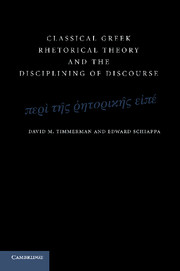Book contents
- Frontmatter
- Contents
- Acknowledgments
- 1 INTRODUCTION: Terms of Art as a Focus in the History of Rhetorical Theory
- 2 DIALEGESTHAI AS A TERM OF ART: Plato and the Disciplining of Dialectic
- 3 PHILOSOPHIA AS A TERM OF ART: Recovering Isocrates
- 4 TERMS OF ART FOR PUBLIC DELIBERATION: Dēmēgoria and Symboulē
- 5 TERMS OF ART AND THE INTERPRETATION OF TEXTS: The Disciplinary Status of the Rhetoric to Alexander
- 6 TERMS OF ART AND INFERRING THEORY: When Did the Parts of a Speech Become Formalized?
- 7 EPILOGUE
- References
- Index
3 - PHILOSOPHIA AS A TERM OF ART: Recovering Isocrates
Published online by Cambridge University Press: 06 July 2010
- Frontmatter
- Contents
- Acknowledgments
- 1 INTRODUCTION: Terms of Art as a Focus in the History of Rhetorical Theory
- 2 DIALEGESTHAI AS A TERM OF ART: Plato and the Disciplining of Dialectic
- 3 PHILOSOPHIA AS A TERM OF ART: Recovering Isocrates
- 4 TERMS OF ART FOR PUBLIC DELIBERATION: Dēmēgoria and Symboulē
- 5 TERMS OF ART AND THE INTERPRETATION OF TEXTS: The Disciplinary Status of the Rhetoric to Alexander
- 6 TERMS OF ART AND INFERRING THEORY: When Did the Parts of a Speech Become Formalized?
- 7 EPILOGUE
- References
- Index
Summary
Terms of art can emerge within a given language community in one of three ways. First, a common term can be given a more specialized use, such as in the case of dialegesthai. Second, a familiar term can be stretched metaphorically to apply to an unfamiliar context, thus we find early attempts to describe what we now call “definition” with terms for dividing or taking apart (diaireō), separating, or setting a border or boundaries (diorizō, horizō). Third, of course, a new term can be introduced through a neologism. As observed previously, Plato introduced many terms by adding an -ikos or -ikē suffix to denote a person who possesses a particular skill (e.g., dialektikos) or to delineate a discrete art (e.g., hē dialektikē). As these examples demonstrate, the addition of a definite article and/or certain suffixes can change a verb to a noun or adjective, which is another route toward advancing the richness of a specialized vocabulary.
In this chapter, we are interested in the emergence of the Greek word philosophia – literally love of knowledge or wisdom – as a term of art in Isocrates. The verb philosopheō (“philosophize” or “pursue knowledge”) appears in Herodotus (1.30.2) to describe Solon as one who traveled to “cultivate knowledge” (philosophoumen), as well as in Thucydides' re-creation of Pericles' funeral oration, in which he claims that Athens “cultivates wisdom without effeminacy” (philosophoumen aneu malakias) (2.40.1).
Information
- Type
- Chapter
- Information
- Publisher: Cambridge University PressPrint publication year: 2010
